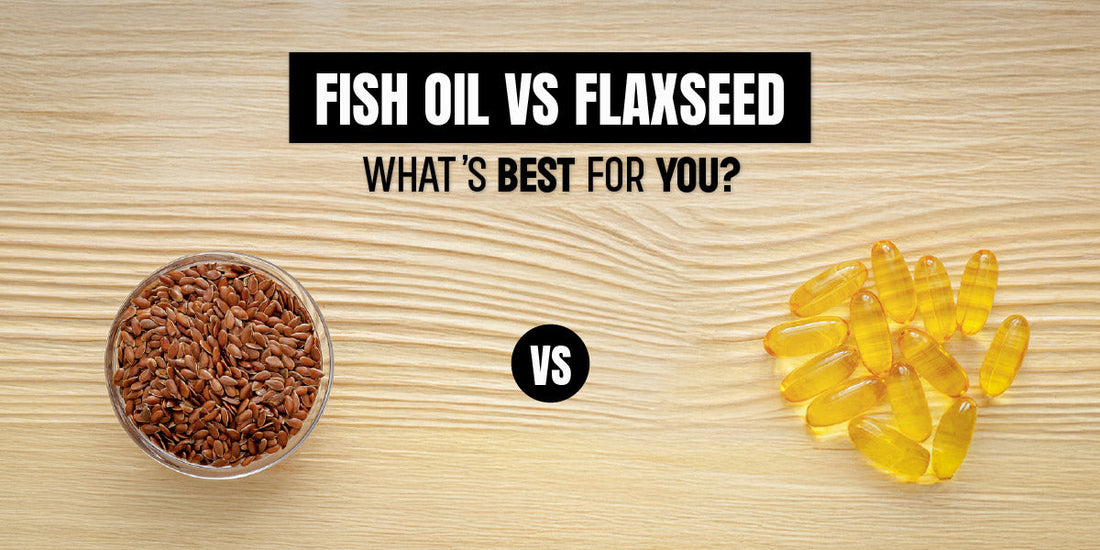
Fish Oil vs Flaxseed Oil: Which One Is Best for You?
byWhen it comes to boosting your omega-3 intake, two heavyweights often battle it out: fish oil and flaxseed oil. Both are popular supplements known for promoting heart health, reducing inflammation, and supporting brain function.
But which one should you choose? Is one better than the other for fitness, heart health, or a vegetarian lifestyle? Let’s dive into the facts.
What Are Omega-3 Fatty Acids?
Omega-3 fatty acids are vital lipids that your body requires but is unable to synthesize independently. Nutrients must be obtained from your diet or supplements. There are three main types of omega-3s:
- EPA (Eicosapentaenoic Acid) – Found in fish oil
- DHA (Docosahexaenoic Acid) – Found in fish oil
- ALA (Alpha-Linolenic Acid) – Found in flaxseed oil and other plant sources
While ALA is a precursor to EPA and DHA, the human body converts only a small amount (5–10%) of ALA into these more potent omega-3s.
Fish Oil: Benefits & Key Facts
Pros:
- Rich in EPA and DHA, which are bioavailable and directly used by the body
- Supports heart health, brain function, and eye health
- Reduces inflammation, especially in joints
- May improve mood and cognitive performance
Cons:
- Not suitable for vegans or vegetarians
- May have a fishy aftertaste or cause burping
- Needs to be sourced sustainably to avoid heavy metals
Flaxseed Oil: Benefits & Key Facts
Pros:
- 100% plant-based – perfect for vegetarians and vegans
- Rich in ALA, a plant-based omega-3
- Supports skin health, hormonal balance, and digestion
- May help reduce cholesterol and promote regularity
Cons:
- ALA conversion to EPA/DHA is limited
- May not provide the same anti-inflammatory benefits as fish oil
- Less researched than marine omega-3s for heart and brain support
Fish Oil vs Flaxseed Oil: Side-by-Side Comparison
|
Feature |
Fish Oil |
Flaxseed Oil |
|
Source |
Fatty fish (e.g., salmon, mackerel) |
Flaxseeds (plant) |
|
Omega-3 Content |
EPA & DHA |
ALA |
|
Bioavailability |
High |
Low (conversion-dependent) |
|
Best For |
Heart health, inflammation, brain health |
Vegan omega-3 support, skin, digestion |
|
Taste |
Fishy (unless flavored) |
Mild nutty flavor |
|
Suitability |
Non-vegan |
Vegan/vegetarian |
Which One Is Best for You?
Choose Fish Oil If:
- You want the most bioavailable omega-3s
- You're targeting joint pain, heart health, or cognitive support
- You're not restricted to a vegan or vegetarian diet
Choose Flaxseed Oil If:
- You follow a plant-based or vegan lifestyle
- You’re looking to improve skin, digestion, or hormonal balance
- You want a gentle, non-fishy alternative
Can You Take Both Together?
Yes! Taking both supplements can be beneficial, especially if you’re looking to cover all bases. For instance, one may consume fish oil to obtain EPA and DHA, while flaxseed oil can be taken for its benefits to fiber and skin health. Just be cautious about total fat intake and consult a healthcare professional if on medications.
Conclusion: Personalized Choice is Key
When it comes to fish oil vs flaxseed oil, the best choice depends on your diet, health goals, and personal preferences. Fish oil leads in potency and research-backed benefits, while flaxseed oil is a clean, vegan-friendly source of essential fats.
Whatever you choose, make sure your omega-3 supplement is high-quality, tested for purity, and fits seamlessly into your health routine.
FAQs
Q: Is flaxseed oil equally effective as fish oil?
A: Flaxseed oil is effective for plant-based omega-3s (ALA), but fish oil offers more direct benefits via EPA and DHA.
Q: Can vegetarians take fish oil?
A: No, but vegetarians can use flaxseed oil or algal oil, which contains plant-based EPA and DHA.
Q: How much omega-3 do I need daily?
A: A dosage of 250–500 mg of combined EPA/DHA is typically advised, or 1.1–1.6 g of ALA for sources based on ALA.






